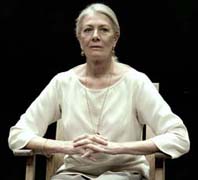
CROYDEN'S CORNER
by Margaret Croyden
"The Year of Magical Thinking"
|
|
|
| Margaret Croyden is a theater reviewer and essayist for the New York Theatre Wire. | |
The Year of Magical Thinking
Starring Vanessa Redgrave
By Joan Didion
Directed by David Hare
Booth Theater
222 West 45th Street
Reviewed by Margaret Croyden April 15, 2007.
Vanessa Redgrave has a hard job playing Joan Didion in "The Year of
Magical Thinking." She must sit on the stage in a straight, plain chair
for one hour 30 minutes and recount the incidents from Joan Didion's memoir
on the death of her husband and daughter. She must stare out into the audience
and capture their attention and dramatize the details of the book. Ms. Redgrave
is a fine, accomplished actress and she does her best with this no action
recitation, but she is the victim of a thankless script, (also written by
Joan Didion), which may have been alright for a book, but is a failure for
the stage. In fact it is not play at all.
Although the piece describes in detail the tragic death of Didion's husband
and daughter, the material barely comes alive, despite Redgave's efforts.
Redgrave tries for simplicity; she seems fearful of appearing and sounding
too sentimental and self pitying. So she rushes through the script in a
hurry which is all to the good (otherwise the night would be completely
boring, although it almost is) and one thanks her and the director David
Hare for the sweeping delivery. But there is a hitch: the performance has
little warmth and little resonance. One expected some expression of deep
feeling, some moment of pain, some emotional underpinnings, some sense of
the tragic. But the work is cold and colorless and Redgrave comes across
as remote and detached.
 |
| Vanessa Redgrave. Photo by Brigitte Lacombe. |
I doubt this is Redgrave's fault; it is in the writing. Joan Didion writes staccato declarative sentences, with no flourish, no adjectives, and no emotional sweep. She writes as if she is discussing a laundry list and giving herself credit for remembering all the details. She knows the medications her daughter received; she knows them by name and can rattle them off. She knows the procedures in the hospitals and takes time to tell us about that. She knows the difference between hospitals and seems to enjoy showing us how much knowledge she has. In fact she comes across as a superior know-it-all --not a flattering picture of Ms. Didion. Unintentionally (perhaps) she displayed an enormous ego in the middle of the tragedy.
However, Vanessa Redgrave manages to hold the audience's attention. She
is a striking figure: her white hair brushed back, grey skirt, bland top,
a little necklace--she is quite beautiful, especially her eyes. But it does
get tiresome to watch her sit there all night quoting from the book.
Moreover, there is something unseemly and narcissistic about the production.
Didion wrote the book, it got marvelous reviews; she made numerous appearances
on television, she received plenty of press. The book became a best seller,
so why put the story on stage in a drab setting, when it is all exxposition
and Didion is not experienced or talented enough to create a play? A book
is one thing and a theater piece is another; the forms are quite different.
Words always matter, of course, but in theater, we need to see the images,
we need to see live action, events happen in front of us, relying just on
exposition will not do. Telling and not showing is considered a cardinal
sin in writing. And good writers show not tell. I'm sure Ms. Didion knows
that. But her personal tragedy took over and unfortunately the rules of
the game were forgotten.
Margaret CROYDEN is the author of "Conversations with Peter Brook 1970-2000" (Farrar,Straus, & Giroux)

| museums | NYTW mail | recordings | coupons | publications | classified